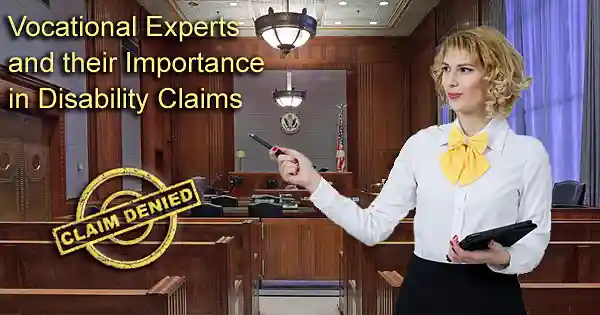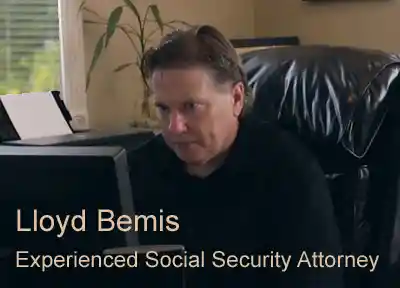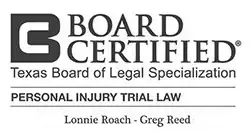Vocational Experts and Why They Are Important in Disability Claims
What is a Vocational Expert and how can they affect my Disability Claim?
Author Attorney Lloyd Bemis:
Updated 1/25/2023
A vocational expert, or VE, is an expert witness called by the Social Security Administration to testify at disability appeal hearings and provide impartial expert evidence before an administrative law judge, or ALJ.

A vocational expert is a witness called by the SSA to testify at disability appeal hearings to provide evidence concerning your ability to work based on the limitations posed by your disability. You can cross examine the VE and an experienced disability lawyer could be crucial. Call 512-454-4000 for help today.
Administrative Law Judges use vocational experts in cases where they must determine whether a claimant is able to perform his or her previous job or other work.
A VE is knowledgeable about the current labor market, job availability, and skills needed to perform specific jobs. Before a scheduled hearing, a vocational expert will review any exhibits provided and then give testimony in person at the hearing. Sometimes a VE will testify by telephone or video teleconference or be asked to provide opinions by responding to written questions called interrogatories. The testimony of a vocational expert can be very important because their opinion about the claimant’s ability to work may affect the outcome of the hearing and determine whether a claim is denied.
The Social Security Administration expects a vocational expert to have knowledge of:
- Skill levels and physical and mental demands of occupations
- Characteristics of various work settings
- The existence and incidence of jobs within occupations
- Transferrable skills analysis and SSA regulatory requirements for transferability of work skills
- Industrial and occupational trends and local labor market conditions
- How the SSA determines whether a claimant is disabled
During an appeal hearing, the judge and the claimant’s attorney will ask the claimant questions about their disability and their work history.
The ALJ will then ask the vocational expert to give his or her opinion about jobs the claimant is able to perform given their limitations. The vocational expert uses the claimant’s testimony about past work experiences to classify physical requirements and skill levels of each prior job the claimant has held and to identify skills which might be transferred to other jobs. If the claimant is not able to work in a previous occupation, the VE considers the skills the claimant has which may enable them to perform different work. It is important for the claimant to be specific when testifying about previous occupations so that the vocational expert does not attribute skills to the claimant they do not have.
A VE can only consider past relevant work (PRW) that a claimant performed in assessing a claimant’s job skills.
The following criteria is used to determine if work is PRW:
- whether claimant performed the job long enough to learn it
- whether claimant performed the job in the last 15 years, and
- whether claimant performed the job at the substantial gainful activity level for the year worked ($1,470/month in 2023).
If you have been denied disability don’t give up! Contact a local Disability lawyer at 512-454-4000 for a free consultation and get the benefits you deserve.
Seasonal work and part-time work can be counted as past relevant work.
Volunteer jobs, unsuccessful work attempts, or jobs performed during a closed period of disability cannot be counted as past relevant work. A closed period of disability is the time between the onset of a disability and the time when a claimant returns to work at the substantial gainful activity level.
The vocational expert rarely questions the claimant directly.
Instead, a VE responds to questions posed by the administrative law judge and the claimant’s attorney at the hearing. These questions are typically framed hypothetically and based on age, work experience, functional limitations and education. For example, an administrative law judge might ask, “What jobs could a person the same age as the claimant be expected to perform if they could not bend or kneel, lift more than 20 pounds, or stand longer than 30 minutes at a time.” If the vocational expert testifies that you can no longer perform your past work, the administrative law judge and your attorney will then ask the VE additional questions to see if you can do other jobs. If the vocational expert believes there is other suitable work you can do, they must give the job titles, the number of positions in your area and the job code assigned in the Dictionary of Occupational Titles.
Your attorney will be allowed to ask the vocational expert questions after the administrative law judge has finished and can challenge the VE’s opinion on what jobs you can do.
This cross-examination is the most important part of the hearing. It takes knowledge and experience to question a vocational expert properly and achieve a successful result. The guidance and advice of a highly skilled attorney can make the difference between denial and approval of an appeal.
Unfortunately, about a quarter of people will become disabled during their working years. If an injury or illness is preventing you from working, you may be eligible to collect disability benefits. If you are thinking of filing for social security or long-term disability we can help. If you have filed for benefits and been denied disability, we can assist in your Social Security appeal. You will want to have an experienced Texas disability attorney who can advocate for you throughout the appeals process. At the Law Offices of Bemis, Roach & Reed, we know how stressful it can be to worry about appealing your denied claim. Don’t give up. Contact us today for a free consultation. Call 512-454-4000 and get help NOW.

Your Free Initial Consultation
Call now:
At Bemis, Roach and Reed, if we can't help you, we will try to find the right attorneys for you.
We offer each of our prospective clients a free no obligation one hour phone or office consultation to see if we can help you and if you are comfortable with us. We know how difficult a time like this can be and how hard the decisions are. If we can be of assistance to you and help you find a solution to your issue we will, even if that means referring you to another attorney.
Let's get you Started:
If you could provide us with some basic information about your claim we will get right back with you with a free case evaluation and schedule your Free Consultation Today.
You can also email us at: contact@brrlaw.com
Kind Words from Our Clients
“The attorneys and staff at Bemis, Roach & Reed have provided me and my husband, Jeff, with stellar advice, care, and service. They made navigating the SSDI process easy, painless, and as timely as possible. During this difficult time in our lives it was a tremendous relief to know they were on our side and keeping us updated on next steps and timelines. We also had questions about my husband’s long term disability insurance and they helped us get those questions answered and resolved without any additional fee. I highly recommend Bemis, Roach & Reed.” – Kelli G
“I needed a lawyer for my case and had googled best lawyers. They came up first on my list and decided to give them a call. From the moment I called I knew I chose the right people. They said they would fight for me and fight they did. They knew what they were doing and kept good communication throughout the process. If you need someone that will listen, understand, and fight then these are the people. HIGHLY RECOMMEND.” – Marcel L.
“I’ve had a great experience working with Bemis, Roach & Reed for my disability case. I spent two years fighting on my own, until I was informed to look for a disability lawyer. Right away, sending in questions was a breeze, and from the moment my case was accepted, everything became a major weight off my shoulders. My newest appeal was filed for me, my medical records and case history sorted for me, and I could finally focus on my appointments and treatment with a little less worry. Everything was explained to me in a way that made sense, the process was set out in an easy to understand way. And, just like that, at the beginning of July 2023, my claim was accepted!” – Sunshinemutt







